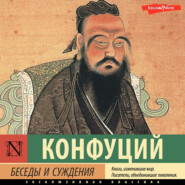По всем вопросам обращайтесь на: info@litportal.ru
(©) 2003-2024.
✖
Chinese Literature
Автор
Год написания книги
2018
Настройки чтения
Размер шрифта
Высота строк
Поля
"The trouble of the superior man will be his own want of abilityit will be no trouble to him that others do not know him.
"Such a man thinks it hard to end his days and leave a name to be no longer named.
"The superior man is exacting of himself; the common man is exacting of others.
"A superior man has self-respect, and does not strive; is sociable, yet no party man.
"He does not promote a man because of his words, or pass over the words because of the man."
Tsz-kung put to him the question, "Is there one word upon which the whole life may proceed?"
The Master replied, "Is not Reciprocity such a word?—what you do not yourself desire, do not put before others."
"So far as I have to do with others, whom do I over-censure? whom do I over-praise? If there be something in them that looks very praiseworthy, that something I put to the test. I would have the men of the present day to walk in the straight path whereby those of the Three Dynasties have walked.
"I have arrived as it were at the annalist's blank page.—Once he who had a horse would lend it to another to mount; now, alas! it is not so.
"Artful speech is the confusion of Virtue. Impatience over little things introduces confusion into great schemes.
"What is disliked by the masses needs inquiring into; so also does that which they have a preference for.
"A man may give breadth to his principlesit is not principles (in themselves) that give breadth to the man.
"Not to retract after committing an error may itself be called error.
"If I have passed the whole day without food and the whole night without sleep, occupied with my thoughts, it profits me nothingI were better engaged in learning.
"The superior man deliberates upon how he may walk in truth, not upon what he may eat. The farmer may plough, and be on the way to wantthe student learns, and is on his way to emolument. To live a right life is the concern of men of nobler mindspoverty gives them none.
"Whatsoever the intellect may attain to, unless the humanity within is powerful enough to keep guard over it, is assuredly lost, even though it be gained.
"If there be intellectual attainments, and the humanity within is powerful enough to keep guard over them, yet, unless (in a ruler) there be dignity in his rule, the people will fail to show him respect.
"Again, given the intellectual attainments, and humanity sufficient to keep watch over them, and also dignity in ruling, yet if his movements be not in accordance with the Rules of Propriety, he is not yet fully qualified.
"The superior man may not be conversant with petty details, and yet may have important matters put into his hands. The inferior man may not be charged with important matters, yet may be conversant with the petty details.
"Good-fellowship is more to men than fire and water. I have seen men stepping into fire and into water, and meeting with death thereby; I have not yet seen a man die from planting his steps in the path of good-fellowship.
"Rely upon good nature. 'Twill not allow precedence even to a teacher.
"The superior man is inflexibly upright, and takes not things upon trust.
"In serving your prince, make your service the serious concern, and let salary be a secondary matter.
"Where instruction is to be given, there must be no distinction of persons.
"Where men's methods are not identical, there can be no planning by one on behalf of another.
"In speaking, perspicuity is all that is needed."
When the blind music-master Mien paid him a visit, on his approaching the steps the Master called out "Steps," and on his coming to the mat, said "Mat." When all in the room were seated, the Master told him "So-and-so is here, so-and-so is here."
When the music-master had left, Tsz-chang said to him, "Is that the way to speak to the music-master?" "Well," he replied, "it is certainly the way to assist him."
BOOK XVI
Against Intestine Strife—Good and Bad Friendships
The Chief of the Ki family was about to make an onslaught upon the Chuen-yu domain.
Yen Yu and Tsz-lu in an interview with Confucius told him, "The Ki is about to have an affair with Chuen-yu."
"Yen," said Confucius, "does not the fault lie with you? The Chief of Chuen-yu in times past was appointed lord of the East Mung (mountain); besides, he dwells within the confines of your own State, and is an official of the State-worship; how can you think of making an onslaught upon him?"
"It is the wish of our Chief," said Yen Yu, "not the wish of either of us ministers."
Confucius said, "Yen, there is a sentence of Cháu Jin which runs thus'Having made manifest their powers and taken their place in the official list, when they find themselves incompetent they resign; if they cannot be firm when danger threatens the government, nor lend support when it is reeling, of what use then shall they be as Assistants?'—Besides, you are wrong in what you said. When a rhinoceros or tiger breaks out of its cage—when a jewel or tortoise-shell ornament is damaged in its casket—whose fault is it?"
"But," said Yen Yu, "so far as Chuen-yu is concerned, it is now fortified, and it is close to Pi; and if he does not now take it, in another generation it will certainly be a trouble to his descendants."
"Yen!" exclaimed Confucius, "it is a painful thing to a superior man to have to desist from saying, 'My wish is so-and-so,' and to be obliged to make apologies. For my part, I have learnt this—that rulers of States and heads of Houses are not greatly concerned about their small following, but about the want of equilibrium in it—that they do not concern themselves about their becoming poor, but about the best means of living quietly and contentedly; for where equilibrium is preserved there will be no poverty, where there is harmony their following will not be small, and where there is quiet contentment there will be no decline nor fall. Now if that be the case, it follows that if men in outlying districts are not submissive, then a reform in education and morals will bring them to; and when they have been so won, then will you render them quiet and contented. At the present time you two are Assistants of your Chief; the people in the outlying districts are not submissive, and cannot be brought round. Your dominion is divided, prostrate, dispersed, cleft in pieces, and you as its guardians are powerless. And plans are being made for taking up arms against those who dwell within your own State. I am apprehensive that the sorrow of the Ki family is not to lie in Chuen-yu, but in those within their own screen."
"When the empire is well-ordered," said Confucius, "it is from the emperor that edicts regarding ceremonial, music, and expeditions to quell rebellion go forth. When it is being ill governed, such edicts emanate from the feudal lords; and when the latter is the case, it will be strange if in ten generations there is not a collapse. If they emanate merely from the high officials, it will be strange if the collapse do not come in five generations. When the State-edicts are in the hands of the subsidiary ministers, it will be strange if in three generations there is no collapse.
"When the empire is well-ordered, government is not left in the hands of high officials.
"When the empire is well-ordered, the common people will cease to discuss public matters."
"For five generations," he said, "the revenue has departed from the ducal household. Four generations ago the government fell into the hands of the high officials. Hence, alas! the straitened means of the descendants of the three Hwan families."
"There are," said he, "three kinds of friendships which are profitable, and three which are detrimental. To make friends with the upright, with the trustworthy, with the experienced, is to gain benefit; to make friends with the subtly perverse, with the artfully pliant, with the subtle in speech, is detrimental."
Again, "There are three kinds of pleasure which are profitable, and three which are detrimental. To take pleasure in going regularly through the various branches of Ceremonial and Music, in speaking of others' goodness, in having many worthy wise friends, is profitable. To take pleasure in wild bold pleasures, in idling carelessly about, in the too jovial accompaniments of feasting, is detrimental."
Again, "Three errors there be, into which they who wait upon their superior may fall:—(1) to speak before the opportunity comes to them to speak, which I call heedless haste; (2) refraining from speaking when the opportunity has come, which I call concealment; and (3) speaking, regardless of the mood he is in, which I call blindness."
Again, "Three things a superior should guard against:—(1) against the lusts of the flesh in his earlier years while the vital powers are not fully developed and fixed; (2) against the spirit of combativeness when he has come to the age of robust manhood and when the vital powers are matured and strong, and (3) against ambitiousness when old age has come on and the vital powers have become weak and decayed."
"Three things also such a man greatly reveres:—(1) the ordinances of Heaven, (2) great men, (3) words of sages. The inferior man knows not the ordinances of Heaven and therefore reveres them not, is unduly familiar in the presence of great men, and scoffs at the words of sages."
"They whose knowledge comes by birth are of all men the first in understanding; they to whom it comes by study are next; men of poor intellectual capacity, who yet study, may be added as a yet inferior class; and lowest of all are they who are poor in intellect and never learn."
"Nine things there are of which the superior man should be mindful:—to be clear in vision, quick in hearing, genial in expression, respectful in demeanor, true in word, serious in duty, inquiring in doubt, firmly self-controlled in anger, just and fair when the way to success opens out before him."
"Some have spoken of 'looking upon goodness as upon something beyond their reach,' and of 'looking upon evil as like plunging one's hands into scalding liquid';—I have seen the men, I have heard the sayings.
"Some, again, have talked of 'living in seclusion to work out their designs,' and of 'exercising themselves in righteous living in order to render their principles the more effective';—I have heard the sayings, I have not seen the men."
"Such a man thinks it hard to end his days and leave a name to be no longer named.
"The superior man is exacting of himself; the common man is exacting of others.
"A superior man has self-respect, and does not strive; is sociable, yet no party man.
"He does not promote a man because of his words, or pass over the words because of the man."
Tsz-kung put to him the question, "Is there one word upon which the whole life may proceed?"
The Master replied, "Is not Reciprocity such a word?—what you do not yourself desire, do not put before others."
"So far as I have to do with others, whom do I over-censure? whom do I over-praise? If there be something in them that looks very praiseworthy, that something I put to the test. I would have the men of the present day to walk in the straight path whereby those of the Three Dynasties have walked.
"I have arrived as it were at the annalist's blank page.—Once he who had a horse would lend it to another to mount; now, alas! it is not so.
"Artful speech is the confusion of Virtue. Impatience over little things introduces confusion into great schemes.
"What is disliked by the masses needs inquiring into; so also does that which they have a preference for.
"A man may give breadth to his principlesit is not principles (in themselves) that give breadth to the man.
"Not to retract after committing an error may itself be called error.
"If I have passed the whole day without food and the whole night without sleep, occupied with my thoughts, it profits me nothingI were better engaged in learning.
"The superior man deliberates upon how he may walk in truth, not upon what he may eat. The farmer may plough, and be on the way to wantthe student learns, and is on his way to emolument. To live a right life is the concern of men of nobler mindspoverty gives them none.
"Whatsoever the intellect may attain to, unless the humanity within is powerful enough to keep guard over it, is assuredly lost, even though it be gained.
"If there be intellectual attainments, and the humanity within is powerful enough to keep guard over them, yet, unless (in a ruler) there be dignity in his rule, the people will fail to show him respect.
"Again, given the intellectual attainments, and humanity sufficient to keep watch over them, and also dignity in ruling, yet if his movements be not in accordance with the Rules of Propriety, he is not yet fully qualified.
"The superior man may not be conversant with petty details, and yet may have important matters put into his hands. The inferior man may not be charged with important matters, yet may be conversant with the petty details.
"Good-fellowship is more to men than fire and water. I have seen men stepping into fire and into water, and meeting with death thereby; I have not yet seen a man die from planting his steps in the path of good-fellowship.
"Rely upon good nature. 'Twill not allow precedence even to a teacher.
"The superior man is inflexibly upright, and takes not things upon trust.
"In serving your prince, make your service the serious concern, and let salary be a secondary matter.
"Where instruction is to be given, there must be no distinction of persons.
"Where men's methods are not identical, there can be no planning by one on behalf of another.
"In speaking, perspicuity is all that is needed."
When the blind music-master Mien paid him a visit, on his approaching the steps the Master called out "Steps," and on his coming to the mat, said "Mat." When all in the room were seated, the Master told him "So-and-so is here, so-and-so is here."
When the music-master had left, Tsz-chang said to him, "Is that the way to speak to the music-master?" "Well," he replied, "it is certainly the way to assist him."
BOOK XVI
Against Intestine Strife—Good and Bad Friendships
The Chief of the Ki family was about to make an onslaught upon the Chuen-yu domain.
Yen Yu and Tsz-lu in an interview with Confucius told him, "The Ki is about to have an affair with Chuen-yu."
"Yen," said Confucius, "does not the fault lie with you? The Chief of Chuen-yu in times past was appointed lord of the East Mung (mountain); besides, he dwells within the confines of your own State, and is an official of the State-worship; how can you think of making an onslaught upon him?"
"It is the wish of our Chief," said Yen Yu, "not the wish of either of us ministers."
Confucius said, "Yen, there is a sentence of Cháu Jin which runs thus'Having made manifest their powers and taken their place in the official list, when they find themselves incompetent they resign; if they cannot be firm when danger threatens the government, nor lend support when it is reeling, of what use then shall they be as Assistants?'—Besides, you are wrong in what you said. When a rhinoceros or tiger breaks out of its cage—when a jewel or tortoise-shell ornament is damaged in its casket—whose fault is it?"
"But," said Yen Yu, "so far as Chuen-yu is concerned, it is now fortified, and it is close to Pi; and if he does not now take it, in another generation it will certainly be a trouble to his descendants."
"Yen!" exclaimed Confucius, "it is a painful thing to a superior man to have to desist from saying, 'My wish is so-and-so,' and to be obliged to make apologies. For my part, I have learnt this—that rulers of States and heads of Houses are not greatly concerned about their small following, but about the want of equilibrium in it—that they do not concern themselves about their becoming poor, but about the best means of living quietly and contentedly; for where equilibrium is preserved there will be no poverty, where there is harmony their following will not be small, and where there is quiet contentment there will be no decline nor fall. Now if that be the case, it follows that if men in outlying districts are not submissive, then a reform in education and morals will bring them to; and when they have been so won, then will you render them quiet and contented. At the present time you two are Assistants of your Chief; the people in the outlying districts are not submissive, and cannot be brought round. Your dominion is divided, prostrate, dispersed, cleft in pieces, and you as its guardians are powerless. And plans are being made for taking up arms against those who dwell within your own State. I am apprehensive that the sorrow of the Ki family is not to lie in Chuen-yu, but in those within their own screen."
"When the empire is well-ordered," said Confucius, "it is from the emperor that edicts regarding ceremonial, music, and expeditions to quell rebellion go forth. When it is being ill governed, such edicts emanate from the feudal lords; and when the latter is the case, it will be strange if in ten generations there is not a collapse. If they emanate merely from the high officials, it will be strange if the collapse do not come in five generations. When the State-edicts are in the hands of the subsidiary ministers, it will be strange if in three generations there is no collapse.
"When the empire is well-ordered, government is not left in the hands of high officials.
"When the empire is well-ordered, the common people will cease to discuss public matters."
"For five generations," he said, "the revenue has departed from the ducal household. Four generations ago the government fell into the hands of the high officials. Hence, alas! the straitened means of the descendants of the three Hwan families."
"There are," said he, "three kinds of friendships which are profitable, and three which are detrimental. To make friends with the upright, with the trustworthy, with the experienced, is to gain benefit; to make friends with the subtly perverse, with the artfully pliant, with the subtle in speech, is detrimental."
Again, "There are three kinds of pleasure which are profitable, and three which are detrimental. To take pleasure in going regularly through the various branches of Ceremonial and Music, in speaking of others' goodness, in having many worthy wise friends, is profitable. To take pleasure in wild bold pleasures, in idling carelessly about, in the too jovial accompaniments of feasting, is detrimental."
Again, "Three errors there be, into which they who wait upon their superior may fall:—(1) to speak before the opportunity comes to them to speak, which I call heedless haste; (2) refraining from speaking when the opportunity has come, which I call concealment; and (3) speaking, regardless of the mood he is in, which I call blindness."
Again, "Three things a superior should guard against:—(1) against the lusts of the flesh in his earlier years while the vital powers are not fully developed and fixed; (2) against the spirit of combativeness when he has come to the age of robust manhood and when the vital powers are matured and strong, and (3) against ambitiousness when old age has come on and the vital powers have become weak and decayed."
"Three things also such a man greatly reveres:—(1) the ordinances of Heaven, (2) great men, (3) words of sages. The inferior man knows not the ordinances of Heaven and therefore reveres them not, is unduly familiar in the presence of great men, and scoffs at the words of sages."
"They whose knowledge comes by birth are of all men the first in understanding; they to whom it comes by study are next; men of poor intellectual capacity, who yet study, may be added as a yet inferior class; and lowest of all are they who are poor in intellect and never learn."
"Nine things there are of which the superior man should be mindful:—to be clear in vision, quick in hearing, genial in expression, respectful in demeanor, true in word, serious in duty, inquiring in doubt, firmly self-controlled in anger, just and fair when the way to success opens out before him."
"Some have spoken of 'looking upon goodness as upon something beyond their reach,' and of 'looking upon evil as like plunging one's hands into scalding liquid';—I have seen the men, I have heard the sayings.
"Some, again, have talked of 'living in seclusion to work out their designs,' and of 'exercising themselves in righteous living in order to render their principles the more effective';—I have heard the sayings, I have not seen the men."

















